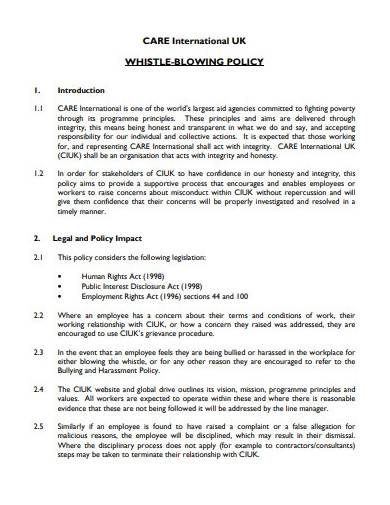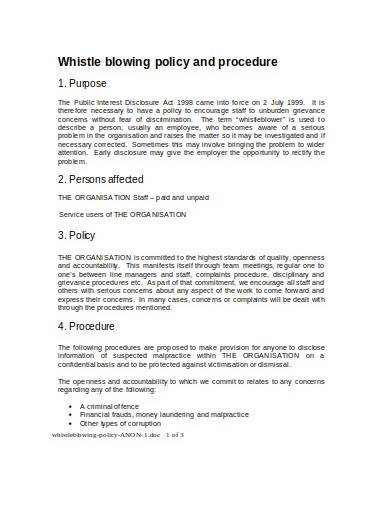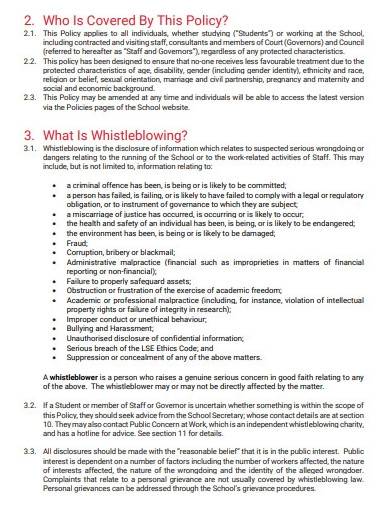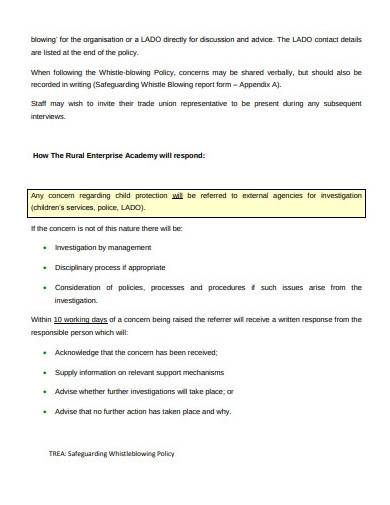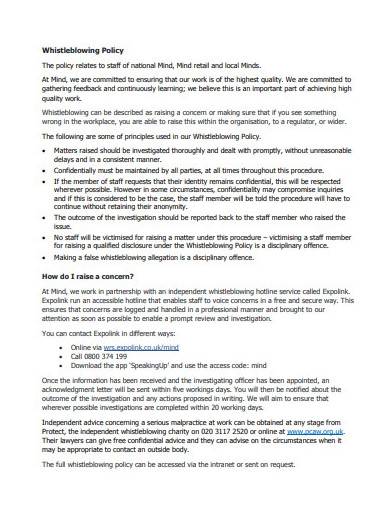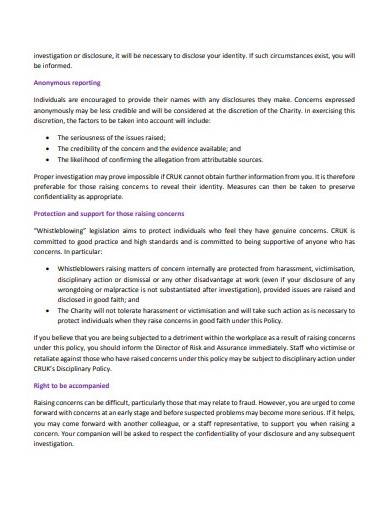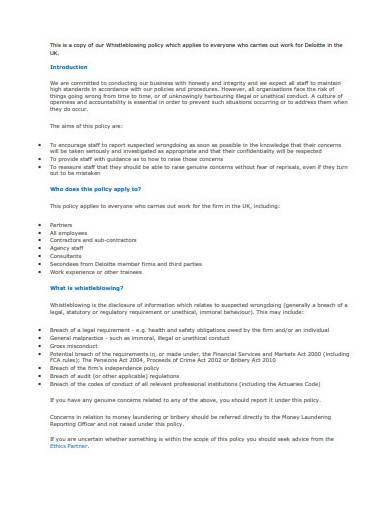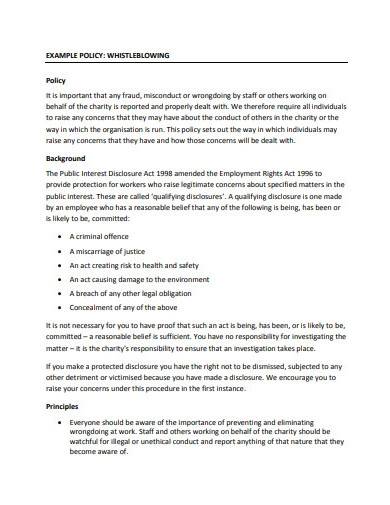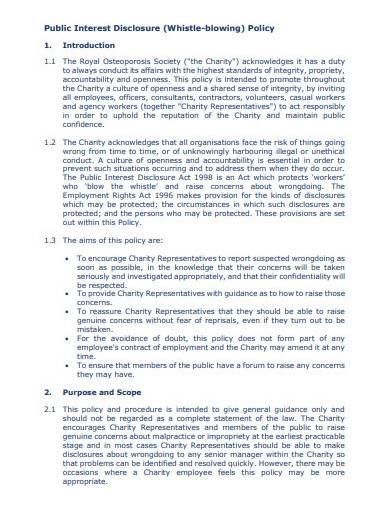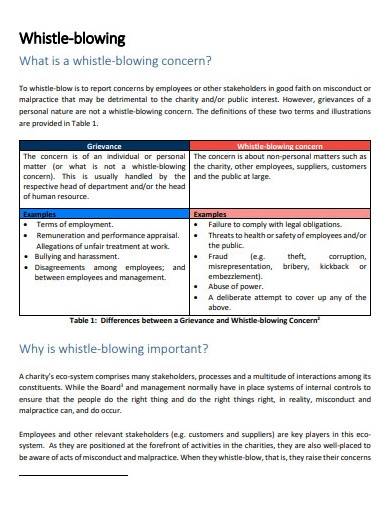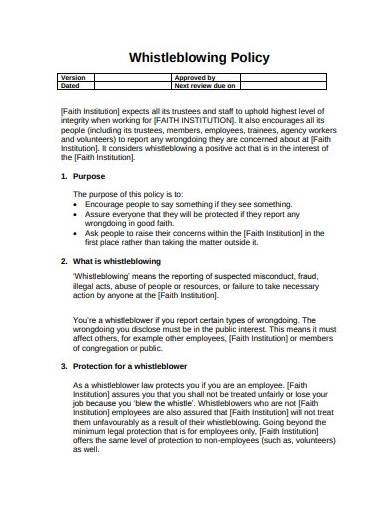A whistleblower refers to a person who raises awareness against an act that is not right or legal. This can be against an individual, business, employer, process, system, or procedure within or outside a certain organization. Whistleblowers can be an individual or a group of people who exposes misconduct such as fraud, scam, hidden information or activity, and leakage that is considered illegal or unethical within the company. A whistleblowing policy is a company policy that is considered an essential part of all businesses or organizations to implement a culture of integrity within them.
FREE 10+ Charity Whistleblowing Policy Samples & Templates in PDF | MS Word
1. Charity Whistleblowing Policy Template
2. Charity Whistle Blowing Policy and Procedure
3. Formal Charity Whistleblowing Policy
4. Sample Charity Whistleblowing Policy Template
5. Whistleblowing Policy Template
6. Standard Charity Whistleblowing Policy
7. Simple Charity Whistleblowing Policy Template
8. Sample Charity Whistleblowing Policy
9. Public Interest Disclosure Policy
10. Charity Whistleblowing Policy & Procedures
11. Basic Whistleblowing Policy Template
What is a Charity Whistleblowing Policy?
Charity whistleblowing policy is a set of rules and guidelines that clearly expresses the commitment of the organization to employees and other key stakeholders that relevant concerns are essential factors in implementing sound governance and all concerns are taken seriously by the organization. This policy encourages employees to raise possible concerns while ensuring confidentiality and their protection as well as explains the process of handling concerns, from its initiation to the case’s closure. Other types of policies that organizations can implement are charity marketing policies, charity recruitment policies, charity financial policies, donation policies, charity volunteer management policies, and more.
How to Create a Charity Whistleblowing Policy
Implementing whistleblowing policies mean that companies allow their team members to report facts and halt all illegal or unethical activities within their organization. This policy aims to encourage open work environment behavior or practices to reassure employees that they can raise issues concerning misconduct and improve their working environment. Whistleblowing is the act of disclosing information on unethical practices within the company such as health and safety issues, risk of damaging the environment, non-compliance with legal duties, and more.
Step 1: Decide on the Purpose or Objectives of the Policy
This section includes the policy’s overall business goals and objectives, the commitment of the organization to the policy, what type of conduct must be reported, and the definition of involved parties who falls under the policy.
Step 2: Provide an Outline of Your Process
This process refers to the procedures that employees must follow when submitting a report including their options when they have to make a disclosure, where they can make the report, the consequence when they want to remain anonymous, information about the investigative process, and who is alerted when a report is submitted.
Step 3: Determine the Main Roles and Responsibilities
Another important factor in developing a whistleblowing policy is determining the key roles and responsibilities of the team. This provides the employees with clarity on who are the specific individuals that will be involved and where they are located.
Step 4: Provide Details on the Governance of the Policy
Governance outlines the people who will be involved in setting and approving the organization’s whistleblowing policy such as when changing the whistleblowing policy as well as the frequency in which you can update the board with relevant reports.
FAQs
What are the benefits of implementing whistleblowing policies?
Implementing a whistleblowing policy in your workplace encourages employees to stay attentive to any misconduct, eliminates corruption, reduces risk, makes employees more responsible by allowing them to raise issues or concerns, and helps in determining false accusations about the organization.
What are the characteristics of an effective whistleblowing policy?
An effective whistleblowing policy is able to establish trust by educating employees and third-party on business standards, providing clear and concise guidance, explaining the proper way of raising concerns, providing a clear definition of the types of concerns that employees can raise, and outlining all legal protections and restrictions.
What are the key elements of whistleblowing policies?
Whistleblowing policies contain key elements such as the policy objectives, policy scope of work, roles and responsibilities, confidentiality and protection, whistleblowing process, communication and training, and monitoring and reviewing.
Charity whistleblowing policies and procedures are documents that state the organization’s commitment to implementing sound governance when dealing with whistleblowing issues and concerns. This policy provides assurance of confidentiality and protection for the individual who raised their concern over an unethical or illegal activity within the organization as well as a framework of responsibility and accountability to ensure the design and effectiveness of the whistleblowing practices and procedures within the company.
Related Posts
Sample Non Profit Proposal Template
FREE 10+ Sample Donation Receipts in MS Word PDF
Program Evaluation Form
FREE 9+ Donation Request Letter Templates in MS Word PDF
Sample Corporate Sponsorship Letter
FREE 10+ Sample Donation Request Forms in PDF MS Word
Sample Donation Form
Benefit Flyer Template
FREE 8+ Thank You Letter Samples in PDF MS Word
FREE 9+ Nonprofit Business Plan Samples in PDF MS Word
FREE 9+ Nonprofit Proposal Samples in PDF MS Word
FREE 6+ Sample Thank You Letter For Donation in MS Word PDF
FREE 6+ Sample Fund-raiser Thank You Letter Templates in PDF
FREE 6+ Sample Donation Request Letter Templates in MS Word ...
FREE 11+ Sample Fundraising Plan Templates in MS Word PDF

